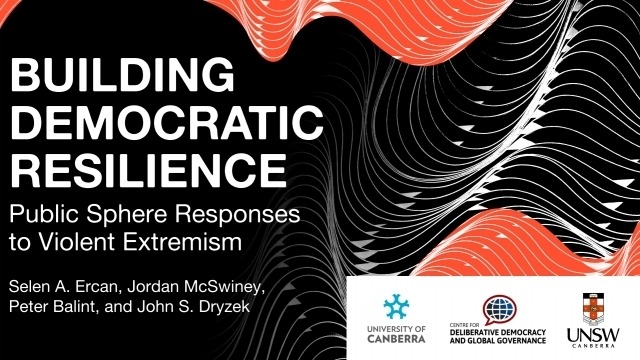Democratic Resilience: Public Sphere Responses to Violent Extremism Report Launch and Panel Discussion
Date & time
Location
Speakers
Event series
Contacts
SHARE

Violent extremism threatens human life and safety. Often overlooked is how violent extremists endanger the public sphere, which is comprised of the practices, institutions and actors that sustain communication about matters of common concern. Violent extremists seek to undermine the public sphere by sowing division, distrust, and fear. How should the public sphere respond to the threats posed by the violent extremism?
The report, Building Democratic Resilience offers a framework for examining and improving the public sphere responses to violent extremism. It develops the concept of ‘democratic resilience’ drawing on the theory of deliberative democracy, and empirical research on countering violent extremism (CVE) in New South Wales (NSW), Australia. It explains how ‘democratic resilience’ differs from and supplements ‘community resilience’, which is the current resilience framework used by the NSW Government. The report offers key insights for academics, public servants, policy makers and the journalists working to develop strategies for tackling violent extremism.
The research undertaken for this report is conducted by academics from the University of Canberra’s Centre for Deliberative Democracy and Global Governance and UNSW Canberra; and funded by the NSW Government, Countering Violent Extremism (CVE) Program 2022.
This will be a hybrid event. To attend online, click 'Register' and get an 'online attendance' ticket. Zoom details will be sent in the confirmation email.
Speakers
Dr Jordan McSwiney is a Postdoctoral Fellow at the Centre for Deliberative Democracy and Global Governance at the University of Canberra. Jordan’s research focuses on the far right, with a particular focus on the organisation of far-right parties and movements, and their use of social media. His work has been published in Information, Communication & Society, New Media & Society, and the Journal of Australian Political Economy.
Dr Emily Corner is a Senior Lecturer of Criminology at the Centre for Social Research and Methods at the Australian National University. Prior to joining the ANU, Emily was a Research Associate at the department of Security and Crime Science at University College London, working on projects examining lone and group-based terrorism, radicalisation, mass murderers, and fixated individuals. Her doctoral research focused on examining mental disorders and terrorist behaviour, and won the Terrorism Research Initiative’s Thesis award in 2016. She has published in leading psychology, forensic science, criminology, threat assessment, and political science journals. She has worked on research projects funded by Defence Science and Technology Laboratory, the European Union, the National Institute of Justice, the Department of Defence, and the Department of Home Affairs. Prior to her doctoral research she worked across step-down, low, and medium secure psychiatric hospitals, in both inpatient and outpatient settings.
Pia van de Zandt is the Director of the Connected Communities team in NSW's Department of Premier and Cabinet. Pia leads a team delivering policy advice and programs to improve social cohesion and inclusion across NSW. This includes coordinating NSW’s whole of government CVE program. With qualifications in social work and law, Pia has held strategic policy, research and service delivery roles in Commonwealth and NSW governments and the community sector to reduce violence against women and children, prevent homelessness and improve social cohesion.










